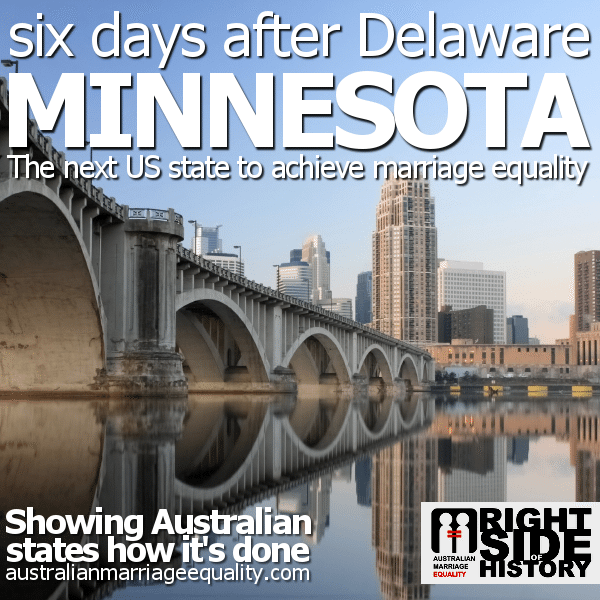In a vote of 37-30, the state Senate approved a marriage equality bill. The Governor is expected to sign the legislation on Tuesday.
Following several hours of often emotional testimony, the Minnesota State Senate voted in favor of marriage equality Monday. The final vote was 37-30.
Gov. Mark Dayton is expected to sign the legislation on Tuesday, The Star Tribune reports. Gay and lesbian Minnesotans can begin getting married on August 1.
A far-reaching amendment that would have allowed individuals and organizations to refuse goods, services, and accommodations to same-sex couples based on sincerely held religious beliefs was overwhelmingly defeated by a vote of 25-42.
Senators opposed to the bill evoked fearful rhetoric about the endangerment of religious freedom, and the “unknown consequences” of “redefining marriage.”
One Senator, who introduced a failed amendment to make sure the words “mother” and “father” were universally codified in state statute, hoped the chamber would step 16 years back, to when the Minnesota Senate overwhelmingly voted to define marriage as the union of one man and one woman.
“I think this is a wrong step in history, a step that we should not be going down,” said Sen. Torrey Westrom. “I think we should affirm what the legislature did in 1997… If marriage is about marrying who you love, where does that stop?” asked Westrom, before his mic was cut, presumably because he ran out of his allotted speaking time.
Sen. Reinert, a member of the Democrat-Farm-Labor party from Duluth, spoke movingly about the love the unmarried Senator hopes to find in his own life.
“I vote today to give something that is not really mine to give,” he said. “I vote today to recognize for all the very same desires that I have for myself. I vote today to ratify the right for all to life, liberty, and the pursuit of public happiness.”
The Minnesota House of Representatives approved the bill Wednesday afternoon by a vote of 75-59, including “aye” votes from four Republicans. In November, Minnesota voters rejected a proposed constitutional amendment that would have banned marriage for same-sex couples, the first time an electorate had rejected such an antigay proposal.

